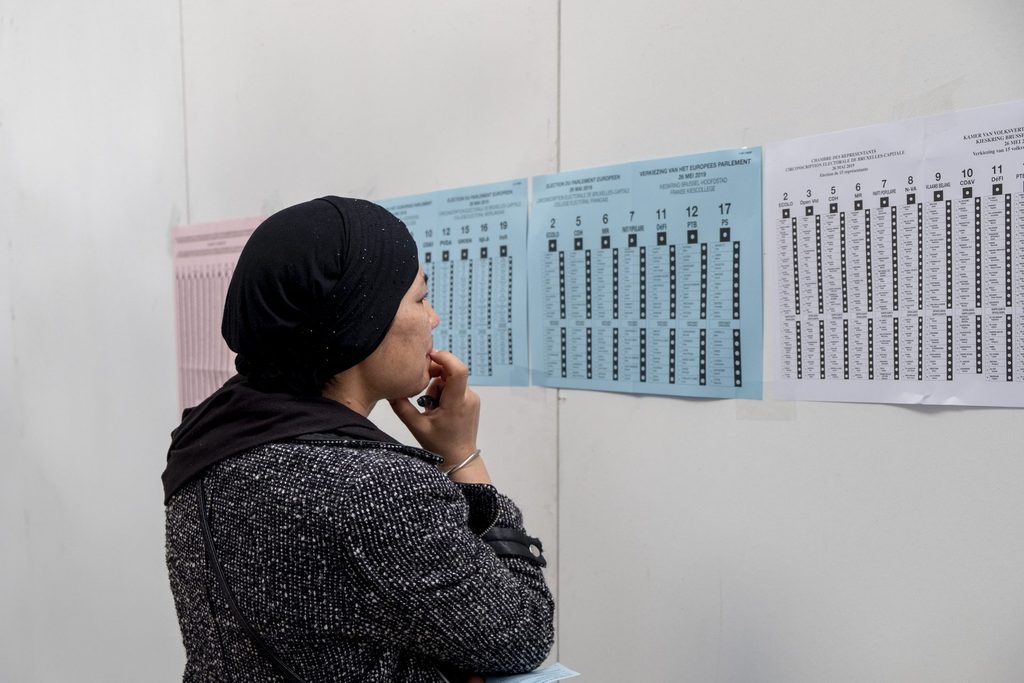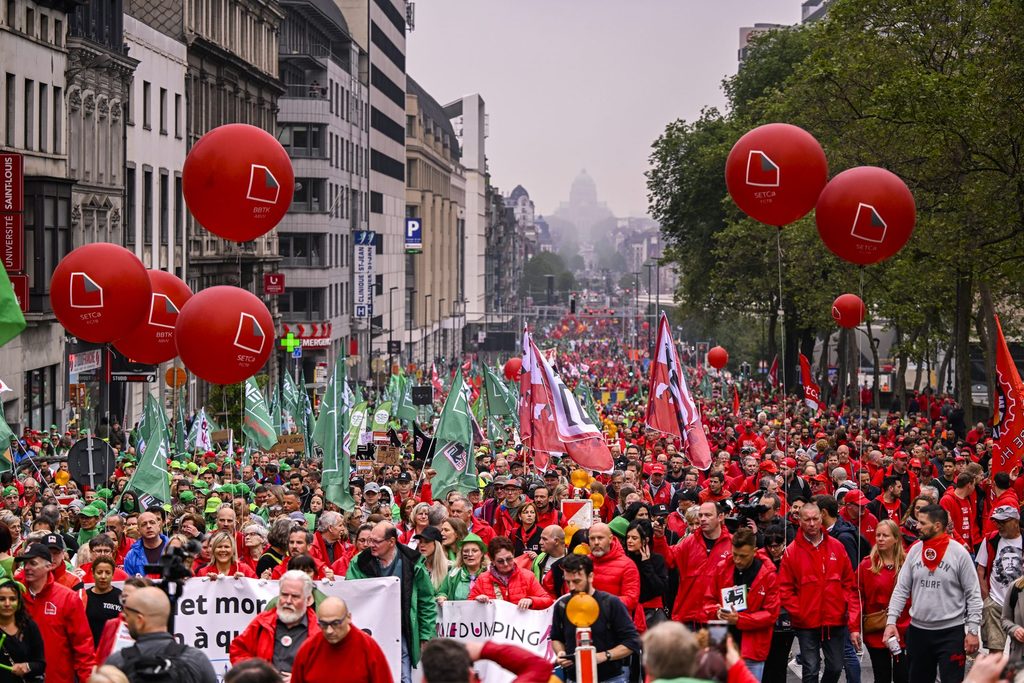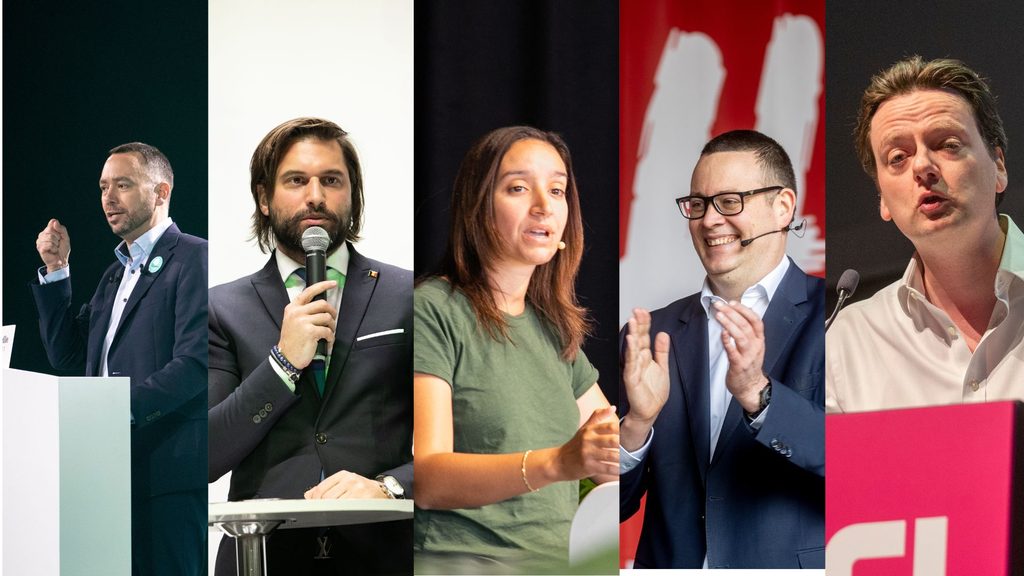The leaders of all French-speaking parties in Belgium were united for a debate on the topic Is our democracy in danger?, organised by Le Soir newspaper on Sunday night.
As campaigns for the upcoming triple election on 9 June 2024 (federal, regional and European) get into swing, concerns about the solidity of Belgium's democracy are being compounded by successive social crises, the rise of extremism and citizen disillusionment.
Kicking off the electoral season, Le Soir put questions to leaders Georges-Louis Bouchez (MR), François De Smet (Défi), Rajae Maouane (Ecolo), Raoul Hedebouw (PTB) and Maxime Prévot (Les Engagés). The Socialist Party (PS) leader Paul Magnette turned down the invitation since the panel lacked gender equality and did not send a replacement.
Le Soir started the debate with the question: Are leaders worried about our democracy, particularly in view of the June 9 elections?
"Yes, a little worried for the preservation of democracy," admitted Rajae Maouane, co-leader of the French-speaking Greens (Ecolo): "We feel democratic fatigue and we have a responsibility as politicians to set an example… Too often we give the impression of being totally disconnected from reality."
Raoul Hedebouw, leader of the Belgian Worker’s Party (PTB), disagreed, insisting he does not feel a disconnection of people from politics: "We talk a lot about politics in homes, in families, among young people." But he acknowledged that the prevalent sentiment is anger "towards the system which is entering a phase of economic and geostrategic instability."
He believes this will lead to greater class distinctions and reclaiming power from large corporate interests. "Today, the economic world decides everything in Belgium. Politicians have let go of their power, through privatisation, by ceding economic tools."

Election lists at a polling station in Koekelberg, Brussels, Sunday 26 May 2019. Credit: Belga / Hatim Kaghat
Conservative leader of Les Engagés, Maxime Prévot, was much more pessimistic, saying that the loss of confidence in politics is nothing new and "cannot be remedied". He argued against "expending energy trying to regain citizen support" and posited that today's "system is exhausted, outdated."
To this point, liberal MR leader Georges-Louis Bouchez disagreed, stating that “throughout the history of mankind, politicians have never been liked," going as far back as ancient Greece to prove his point before adding that "anti-politics was stronger in the 1930s."
Participation or representation?
Bouchez pushed back against a more participatory democracy, saying instead that political leaders should be empowered to achieve better results: "You put 40 citizens in a room to determine the layout of a place, they will find themselves in the same kind of discussion as politicians."
The MR leader believes that more media debates will help "to explain issues and social projects." He proposed an audit for all politicians based on the objectives set and the money spent.
Défi leader Francois De Smet agreed with the notion that people do not want more citizen participation. "They want the job done, to understand what is being done with their money, and to be able to measure effectiveness and be told the truth – even the bad news." De Smet also argued for a term limit for politicians of no more than three successive mandates.

Senate at the Federal Parliament in Brussels. Credit: Belga / Nicolas Maeterlinck
Ecolo leader Maouane disagreed with Bouchez and De Smet: "The fact that citizens can sit alongside politicians and realise the constraints we sometimes face is useful. Understanding the political system, to avoid falling into incomprehension or anger, is also important."
For Les Engagés, Prévot praised the idea of greater democratic participation and called for "a model that is much more inclusive, participatory, more horizontal in decision-making, which must be taken while also thinking of future generations."
Engaging the public
Prévot argued that Belgium must get away from the idea "that politicians know and citizens do not know." For the centrist leader, a Swiss-style referendum allowing citizens to take decisions on key issues would be preferable.
"I see no reason to think that a Belgian is any less intelligent than a Swiss person. We still live under the trauma of the royal question, believing that allowing the Belgian population to express themselves through a referendum would accelerate the break-up of the country," he said.

Mass protest against social dumping and the attacks on the right to strike in Brussels, May 2023. Credit: Belga / Laurie Dieffembacq
For the PTB, a positive attitude is key: "Hope mobilises people," Hebedouw declared. "This is how they see that they can change something. This is how we engage." The PTB leader cited the party’s growing membership and high levels of activism and engagement with the working class. "On that side, I am not fatalistic, the PTB has fierce support."
Is the PTB an extremist party?
One particular question seemed especially divisive: Is communism dangerous for democracy? But Hedebouw fought back: "What was done in Russia, yes, of course. That's not what I want to do. Communists have also participated in governments in France, in Spain…"
On the matter of a setting up a cordon sanitaire around the far-left in the same vein as that which has sidelined far-right Vlaams Belang, Hebedouw hit back: "Marxist movements found themselves at the forefront of the anti-fascist struggle… In Europe, with the exception of Georges-Louis Bouchez, there is no tradition of classifying the Marxist left as undemocratic. We take our responsibilities as an anti-fascist party."
Related News
- A beginner's guide to Belgium's political parties
- De Wever attack on Vlaams Belang shows divide among Flemish separatists
- Belgium's elections likely to be held on 9 June 2024
Centrist François De Smet argued against making an equivalence between the far-left and the far-right: "There are some who are racist and others who are not." But he denounced the PTB for using legitimate anger as a form of galvanising popular support: "You don't have the monopoly of the people."
Greens leader Maouane echoed this critique of comparing the far right and left but criticised the PTB for its populism. "Populism gives simple answers to complex problems by ignoring nuance. Some parties, like the PTB, tend to fall for easy answers."
The empty seat
Missing from the debate was the leader of the Socialists, Paul Magnette, who preferred to leave his seat empty on the grounds that the panel was not composed equally of men and women.
"For us, this is a very important question of principle which has been the subject of long debates in the office and a long-prepared congress," he explained to Le Soir. "We do not want to participate in panels that do not respect gender equality."

